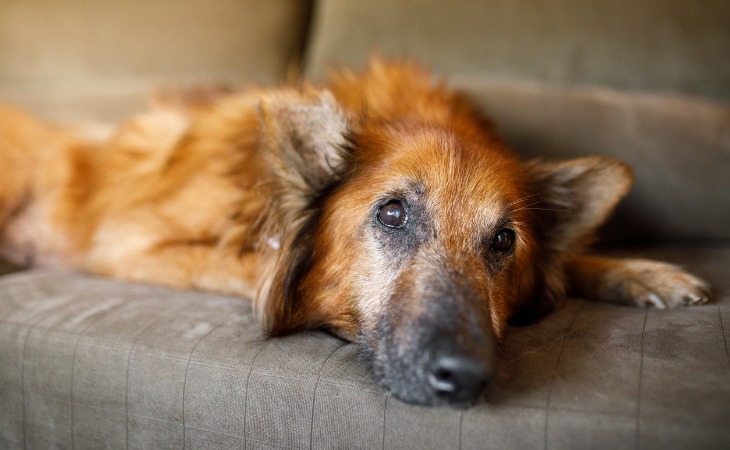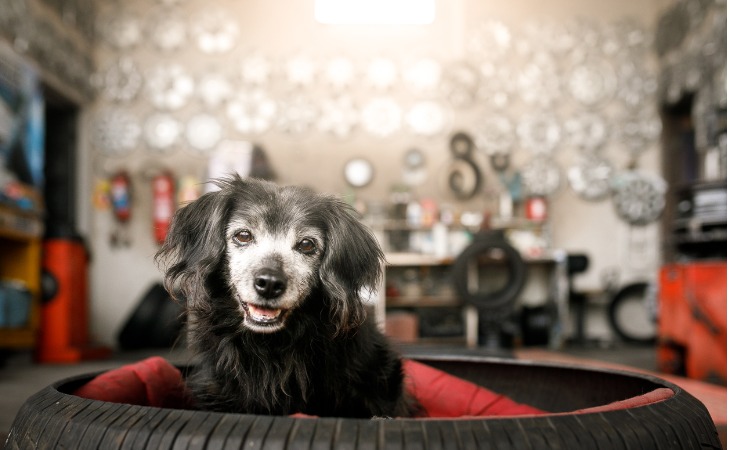When dogs get older, they need more care and attention. Senior dogs need a lot of exercise, a healthy diet, and regular vet visits to stay in good health. We will share some tips and advice about how to take care of a senior dog in this article.
What are some of the signs of aging in dogs?
If you’ve had a dog for several years, you will notice a few signs that show that your dog is starting to age. Knowing these signs ahead of time will allow you to take better care of your dog as they age and help them age well.
Your dog is less active
If your four-legged friend eats and drinks normally and doesn’t seem to be suffering from a wound or illness, a decrease in your dog’s activity level is most likely due to their age. As dogs age, dogs who used to take long walks or run around could start to slow down during walks or no longer want to walk far. It’s also common for senior dogs to not want to play as much, or not at all. If they suddenly become tired, lethargic, and would rather spend time relaxing on the couch, it’s probably a sign that they are aging.
As your dog ages, you might also notice that they get sick more often. Senior dogs often more susceptible to diseases and conditions such as cancer and arthritis. With that being said, these diseases can affect any dog. Senior dogs are just more sensitive to them.
Your dog is losing muscles and bone density
Losing muscles and bone density is also a common sign of aging in dogs. As your dog’s muscles and bones start to get weaker, they might start to feel pain. This usually leads to a decrease in their activity level and mobility as they can have difficulties moving around. When this happens, your should take adequate measures to take good care of your dog.
With age, dogs can start to lose some cognitive function, which can lead to memory, reasoning, and problem-solving issues. If you notice that your dog has a hard time learning new tricks, remember familiar commands, or seems confused, this can be a sign that your dogs cognitive function is declining.
Your dog’s sleeping and eating habits have changed
Another common sign of aging in dogs is a change in sleeping habits. As dogs get older, they can sleep more during the day and have problems sleeping at night. If your dog suddenly starts sleeping more or has difficulties staying asleep, this could be a sign of aging.
Aging can also lead to changes in your dog’s appetite. Some senior dogs are less interested in food and can lose weight, while others can sart to beg for food more often and even search the trash can for things to eat.

Our tips for taking care of your senior dog
Taking good care of your senior dog is very important to help them age well. Here are our tops tips to help you take care of your senior dog without too much difficulty.
Ensure that your senior dog stays active and engaged
Keep your dog active by playing with them or by going on walks. This will help keep your dog healthy and prevent health problems like obesity and arthritis. You should however adapt the activities that you enjoy together as they grow older. For example, if your senior dog has a hard time going on long walks, you can try going on shorter walks or playing ball at the park or in your backyard. As dog get older, they might start to lose interest in toys and things that they used to enjoy. This is normal and it’s nothing to worry about. Simply try to keep your dog engaged and do things that your dog likes.
Give your dog good quality food
As your dog enters their golden years, their metabolism starts to slow down. This means that they don’t need as much calories as they did when they were a puppy or an adult dog. However, it is important to ensure that that they get enough nutrients to keep them in good health. They need food that is easy to digest and that is rich in nutrients. Ask your vet which food is best adapted to your dog’s age. You can also find dog food that is specifically formulated for senior dogs.
In any case, avoid giving your dog your leftovers as this can lead to obesity and other health issues.
Give your dog plenty of water
Senior dogs are more susceptible to dehydration. It is therefore important to make sure they always have water at their disposal. It has been scientifically proven that some people’s perception of thirst can diminish as they get older. Consequently, they have a harder time knowing when they should drink and could get dehydrated more easily. The same goes for dogs. Give your dog small quantities of water throughout the day instead of filling a large bowl.
Groom your dog regularly
In order to take good care of your dog, it is important to groom them regularly. Brush their hair. Keep them clean and in good health. Also make sure to pay special attention to the your dog’s claws and paws. It’s best to cut their claws regularly and keep a close eye on their paws to make sure that there are not cuts or cracks.
Senior dogs are more susceptible to gum-related diseases. For this reason, it’s best to brush your dog’s teeth regularly.
Keep an eye on your dog’s health and bring them to the vet
As dogs get older, they become more sensitive when it comes to health problems. Because of this, you should take your dog to the vet more often for check-ups to ensure that any health problem could be detected early on. In addition, keep an eye on your dog’s weight, energy level, appetite and, toilet habits. All of these elements can be signs of an underlying health condition.
Get pet insurance for your senior dog
Some people get pet insurance for their senior dog. This is a great idea because it could help pay for a part of the costs related to your dog’s health as they grow older. When choosing pet insurance for your senior dog, it is important to take into account the cost of the contract and the level of coverage that is offered. Policies that cover routine care, such as yearly exams and vaccinations, are good value because they can help you avoid costly veterinary bills. Policies that also cover serious illnesses and injuries are also a wise investment, especially if your senior dog has a history of health problems.
Give your senior dog a lot of love and attention
As your dog ages, they need more love and attention. They might become more affectionate and want to spend more time with you. This is normal behavior for a senior dog.
It’s also good to know that as dogs grow older, they can start to present health problems. They might also become less active and have a harder time doing things that they were able to do easily in the apst. It is normal and you need to be patient with them. Be gentle and let them rest when they need to.
Taking care of a senior dog can be a challenge, but it is very gratifying. Just remember to keep your dog active, to give them a lot of love and affection, and to be patient with them as they get age. If you do this, your dog will age wonderfully and will enjoy their golden years.

